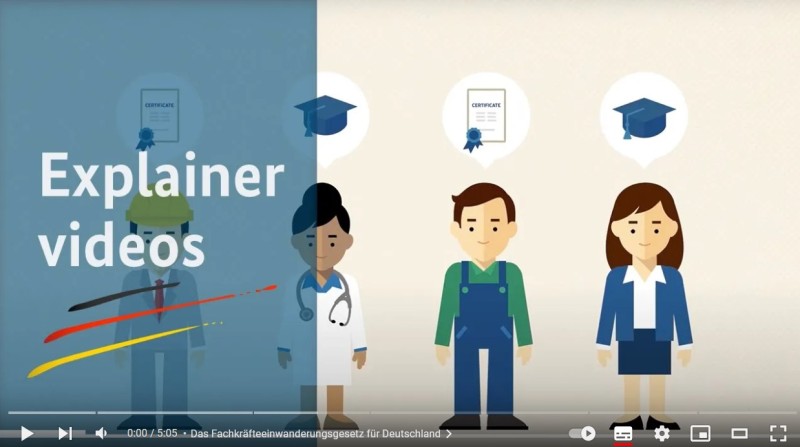Skilled Worker Strategy of the Federal Government.
The goal of the Skilled Worker Strategy is to counteract the growth of the skilled labor shortage, among other things, by implementing various measures, including the immigration of foreign skilled workers.

Germany welcomes doctors and medical professionals from abroad!
There is a significant shortage of skilled professionals in the healthcare sector
- 200,000 to 300,000 open positions for medical professionals.
- 40,000 to 70,000 open positions for doctors.



Causes of the skilled labor shortage in Germany.
-
Shortage of young
skilled workers01In Germany, the proportion of doctors (medical professionals) over the age of 55 accounts for 42% of the total. The number of graduates in medical professions who are willing to fill the vacant positions is not sufficient. The German healthcare system needs young and motivated professionals who are ready to commit to the well-being of society.
-
Increase in the medical
supply02The German healthcare system is constantly being modernized and further developed: medical departments are being expanded, the number of medical facilities and services offered is increasing. However, the number of university graduates and foreign professionals is not sufficient to meet the emerging and increasing skilled labor shortage.
-
Demographic change
03One of the main causes of the skilled labor shortage is the demographic change in Germany. By 2030, the population of working age is projected to decrease to 45.9 million, and by 2060, it will further decline to only 35.7 million. As fewer people are being born, there are fewer workers available to the labor market in general, and especially as needed skilled professionals. The aging population presents a particularly challenging situation for the field of elderly and healthcare, as the demand for skilled nursing professionals increases with the aging society.
Skilled Immigration Act
The law applies to foreign qualified professionals from the medical field as well as other sectors who intend to engage in long-term employment in Germany.
The main goal of the law is to attract qualified professionals, including doctors and medical professionals from abroad, to the German healthcare system.
What does the new skilled worker strategy of the federal government include?
- Easier access to the job market: The previous restriction on employment in a strictly defined field has been lifted. Skilled professionals from abroad can now be employed in related fields.
- Abolished priority rule: Previously, the relevant authorities used to examine whether there was a suitable domestic candidate for the desired position before hiring a foreign professional, who would then be given preference over the foreign applicant. This procedure has been abolished.
- Simplified entry rules: Qualified medical professionals with a recognized vocational training in Germany are now granted a visa for 6-18 months for the purpose of applying, starting employment, and taking the necessary qualification exams.
- Residence permit: Skilled professionals from abroad can now obtain a settlement permit (Niederlassungserlaubnis) after just 4 years. Previously, it was a minimum of 5 years.
Government's skilled workforce strategy, as of October 12, 2022
FAQ - Frequently Asked Questions:
On average, it takes about 6 to 11 months to immigrate to Germany, and an additional 6 months for the final recognition of professional qualifications and employment as a skilled worker.
Yes, after successful recognition and employment, the German federal government allows you to apply for family reunification. Spouses and children can also immigrate to Germany in the future.
The service "consultation" includes a comprehensive analysis of documents and verification of the possibility of immigration to Germany in a specific case. If there are any obstacles, we will inform you in advance. Each recognition process is unique, so the dates, procedures, and employment conditions are determined individually.
So-called deficits are differences between your professional qualification and the state-regulated qualification awarded in Germany for the corresponding profession. After processing the application for recognition, the recognition authority issues a deficit assessment notice for the skilled professional.
The deficits consist of a specific number of hours in clinical practice and/or theory. The healthcare professional can compensate for these deficits in two ways: either by participating in a theory-practice course as part of an adaptation course or by taking an oral proficiency examination. For doctors and academic professions from non-EU countries, the oral proficiency examination is usually required.
Preparation for the proficiency examination requires careful and time-intensive preparation. We recommend that you prepare independently or with the help of the appropriate course on our online education platform in advance.
The employment opportunities depend on several factors: possession of a medical professional qualification recognized in your country, your German and specialized language skills, and the regional demand for your professional profile in Germany.
Yes, a job interview is mandatory. After the job interview, employers can assess whether you are suitable for the internship/observation in the clinic and a potential employment relationship.
Depending on the chosen clinic, we can conduct the job interview partially online and even before your arrival in Germany.
The Medheilberuf Institute accompanies and supports you at every step throughout the entire recognition and immigration process:
- Preparation and compilation of the required documents
- Learning the specialized German language for medical professionals
- Job search, application, and commencement of employment
- Relocation, official registration, and support with settling in
Step-by-step support during the recognition process



